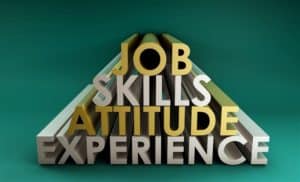
Hard Skills
Let’s first look at hard skills. Career expert Lei Han defines hard skills this way: “Hard skills are skills where the rules stay the same regardless of which company, circumstance or people you work with.” A few examples include:
- Computer proficiency
- Typing
- Speaking a foreign language
- Operating machinery
Soft Skills
Workplace soft skills are associated with an employee’s personality and are tough to quantify. According to CareerBuilder, 77% of hiring managers and HR professionals surveyed in 2014 said soft skills are just as important as hard skills. And 16% of those surveyed felt that soft skills were more important than hard skills.
The top 5 most popular soft skills employers are looking for when hiring are:
1) Strong work ethic – 73%
2) Dependability – 73%
3) Positive attitude – 72%
4) Self-motivated – 66%
5) Team-oriented – 60%
Click here to view the survey’s top 10 list.
Find a Balance
For employers who are weighing the importance of both skill sets, our suggestion is to hire employees with a good balance of both hard and soft skills. Obviously, each company is different and each hiring scenario is unique. So in some situations, one skill set might take precedence over the other.
If you need help evaluating a candidate’s skill set, you should consider using a Skill Assessment service. This type of service is offered by some staffing firms and it can include both hard skill and behavioral assessments that help an employer determine if they’re choosing the right hire.
What’s your take on hard vs. soft skills? Do you think one is more important than the other? Share your comments with us.
